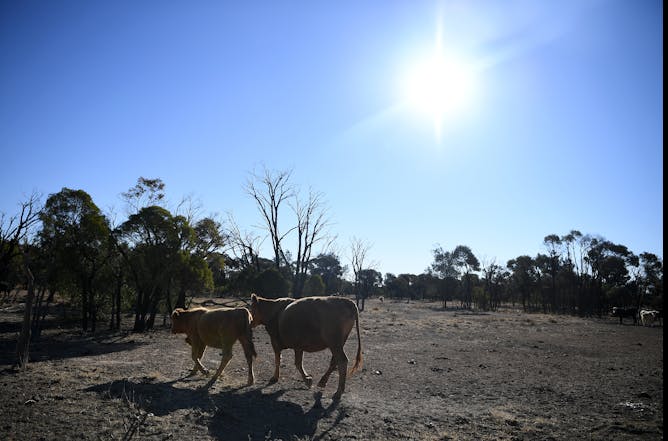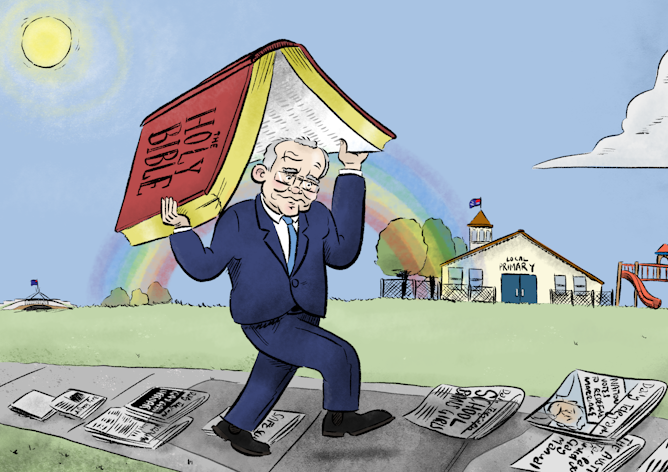|
|
|
Editor's note
|
|
Australia’s farmers have long had higher levels of climate denial - which is ironic considering they’re at the front line of drought and extreme weather. But there is evidence this tide has turned over the past decade, with a growing acceptance among farmers of the reality of climate change. As Sarah Ann Wheeler and Céline Nauges write, a recent survey showed 43% of farmers accept climate change poses a threat to their region. Compare
that with 2010, when a third of Australian farmers didn’t accept the science of climate change at all.
And while we’re on matters of faith, Robyn Whitaker today examines how Prime Minister Scott Morrison’s faith might inform his views on gender and sexuality. Whitaker argues Morrison’s view on these issues implies a conservative approach to the Bible where “biblical truth” is viewed as at odds with medical and scientific knowledge. But it’s a dichotomy that need not exist, because the Bible should not be read that literally.
|
Michael Hopkin
Section Editor: Energy + Environment
|

|
|
Top story
|

Many farmers are now facing a future in which it is much harder to make a living off the land.
AAP Image/Dan Peled
Sarah Ann Wheeler, University of Adelaide; Céline Nauges, INRA
A decade ago, only a third of farmers accepted the science of climate change. But surveys show attitudes have shifted in recent years as the farming community begins to confront what the future holds.
|

Wes Mountain/The Conversation
Robyn J. Whitaker, University of Divinity
The prime minister's pentecostal faith champions a simplistic reading of the Bible - but that can lead its followers to a narrow view of the world.
|

A number of complex factors leads to someone reaching a point where they can no longer cope. We can’t let them get there in the first place.
Greg Rakozy/Unsplash
Helen Stallman, University of South Australia
Many current interventions focus on raising awareness of suicide, or preventing suicide at the point just prior to death. Many of those not assessed as being at "high risk" are left without support.
|
Arts + Culture
|
-
Tom van Laer, City, University of London
For decades, academics have been portrayed as brilliant, heroic men on our cinema screens. It's time to tell the story of more heroic female scholars. Here are some suggestions.
-
Madeline Roycroft, University of Melbourne
Pelléas and Mélisande tells a story of forbidden love between its title characters, set in the fictitious kingdom of Allemonde. However the action offstage before the opera's 1902 premiere was just as dramatic.
|
|
Science + Technology
|
-
Amy Prendergast, University of Melbourne
Archaeologists are trash sifters. They use clues preserved in artefacts, plant and animal remains that people threw away or left behind to reconstruct the past.
-
Alice Gorman, Flinders University; Heather L. Robinson, Flinders University
The new film is a down-to-Earth portrayal of astronaut Neil Armstrong and our complex relationship with the Moon.
|
|
Business + Economy
|
-
Ben Phillips, Australian National University
Energy prices have doubled in ten years, but as a proportion of income, most of us are paying no more.
-
Richard Holden, UNSW
Australia's unemployment rate may have to fall much more before we see any wages growth.
-
Tom van Laer, City, University of London
Reviews are essentially short stories. The best use the same elements that make a novel gripping.
|
|
Health + Medicine
|
-
Mihiri Silva, Murdoch Children's Research Institute; Katrina Scurrah, University of Melbourne; Nicky Kilpatrick, Royal Children's Hospital
Despite good oral hygiene, some children have weak teeth that are more prone to decay.
|
|
Politics + Society
|
-
Jarryd Bartle, RMIT University; Greg Stratton, RMIT University; Michele Ruyters, RMIT University
An investigation by RMIT researchers shows that police failed to disclose 2,000 recordings of Keli Lane to defence attorneys. Failure to disclose evidence is a common issue in criminal cases.
-
David Robinson, Edith Cowan University
Understanding the impact of Apartheid requires looking beyond Nelson Mandela's achievements to the bloody struggles of the African National Congress and international forces prolonging the violence.
-
Andrea Carson, University of Melbourne; Matthew Ricketson, Deakin University
Today on the podcast we're talking filter bubbles, fake news, opinion vs fact. Media Files asks two experts how the media and politics influence each other - and why that's causing concern.
|
|
Environment + Energy
|
-
Alan Finkel, Office of the Chief Scientist
The latest UN climate report makes it clear that the task of limiting climate change is urgent and huge. We must start to transform our economy today, but it will bring rewards as well as challenges.
-
Michelle Grattan, University of Canberra
Alex Turnbull said in his video the IPCC report “frankly was terrifying … and it's seemingly insane to me that we could not be doing something about this and soon”.
-
Nanthi Bolan, University of Newcastle
Adapting to climate change means improving soil health, so it can hold more water (even during droughts).
|
|
| |
Featured jobs
|

|
University of Melbourne — Parkville, Victoria
|

|
La Trobe University — Bundoora, Victoria
|

|
RMIT University — Melbourne, Victoria
|

|
University of Tasmania — Hobart, Tasmania
|
|
|
|
Featured events
|

|
The University of Sydney, Sydney, New South Wales, 2006, Australia — University of Sydney
|

|
Deakin Downtown, Level 12, Tower 2 Collins Square, 727 Collins Street, , Docklands, Victoria, 3008, Australia — Deakin University
|

|
Monash University, Building 12, 15 Ancora Imparo Way, Clayton, Victoria, 3800, Australia — Monash University
|

|
UTS Business School, 14-28 Ultimo Rd , Ultimo, New South Wales, 2007, Australia — University of Technology Sydney
|
|
|
|
| |
| |
| |
| |
| |
|
|
|
|
|
|
|